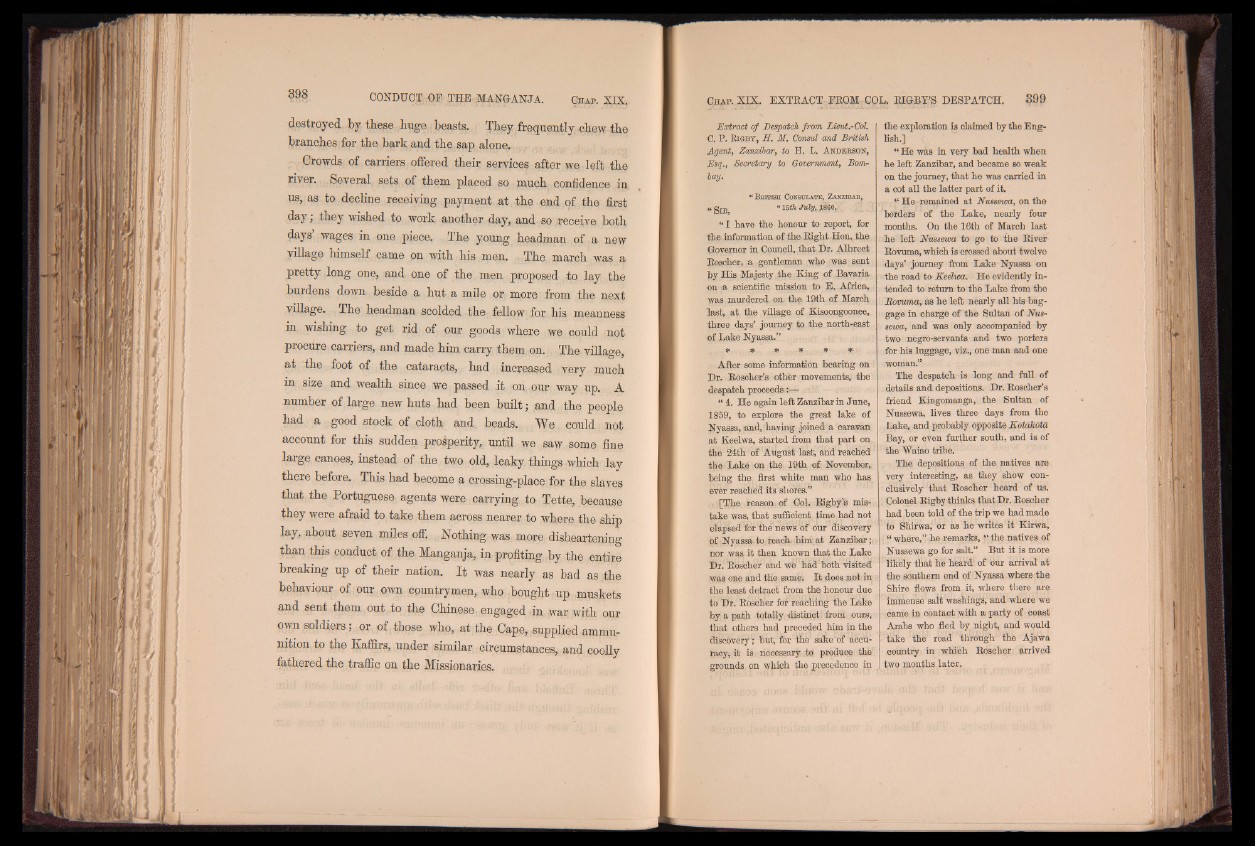
destroyed by these huge beasts. They frequently chew the
branches for the bark and the sap alone.
Crowds of carriers offered their services after we left the
river. Several sets of them placed so much confidence in
us, as to decline receiving payment at the end of the first
day; they wished to work another day, and so receive both
days wages in one piece. The young headman of a new
village himself came on with his men. The march was a
pretty long one, and one of the men proposed to lay the
burdens down beside a hut a mile or more from the next
village. The headman scolded the fellow for his meanness
in wishing to get rid of our goods where -we could not
procure carriers, and made him carry them on. The village,
at the foot of the cataracts, had increased very much
in size and wealth since we passed it on. our way up. A.
number of large new huts had been built; and the people
had a good stock of cloth and. beads. We could not
account for this sudden prosperity, until we saw some fine
large canoes, instead of the two old, leaky things which lay
there before. This had become a crossing-place for the slaves
that the Portuguese agents were carrying to Tette, because
they were afraid to take them across nearer to where the ship
lay, about seven miles off. Nothing was more disheartening
than this conduct of the Manganja, in profiting by the entire
breaking up of their nation. I t was nearly as bad as the
behaviour of our own cpuntrymen, who bought up muskets
and sent them out to the Chinese engaged in war; with our
own soldiers; or of,those who, at the Cape, supplied ammunition
to the Kaffirs, under similar circumstances, and coolly
fathered the traffic on the Missionaries.
Extract of Despatch from Lieut.-Col.
C. P. Rigby, H. M. Consul and British
Agent, Zanzibar, to H. L. A n d e rso n ,
Esq., Secretary to Government, Bombay.
“ Bk itish Consulate, Z anzibar,
“ Sir, m o.>
“ I have the honour to report, for
the information of the Eight Honv the
Governor in Council, that Dr. Albrect
Eoscher, a gentleman who was sent
by His Majesty the King of Bavaria
on a scientific mission to E. Africa,
was murdered on the 19th of March
last, at the village of Kisoongoonee,
three days* journey to the north-east
of Lake Nyassa.”
* * * * * *
After some information bearing on
Dr. Roscher’s other movements, the
despatch proceeds:—
“ 4. He again left Zanzibar in June,
1859, to explore the great lake of
Nyassa, and, having joined a caravan
at Keelwa, started from that part on
the 24th of August last, and reached
the Lake on the 19th of November,
being the first white man who has
ever reached its shores.”
j TThe reason of Col. Rigby’s mistake
was, that sufficient, time had not
elapsed for'the news of our disco very
of Nyassa to reach him at Zanzibar;
nor was it then known that the Lake
Dr. Roscher and wb had both visited
was one and the same. It does not in
the least detract from the honour due
to Dr.'Roscher fof reaching the Lake
by a path totally distinct'from ours,
that others had preceded him in the
discovery; but, for the sake of accu-
racy, it is necessary to produce the
grounds, on which the precedence in
the exploration is claimed by the English.]
“ He was in very bad health when
he left Zanzibar, and became so weak
on the journey, that he was carried in
a cot all the latter part of it.
“ lie remained at Nussewa, on the
borders of the Lake, nearly four
months. On the 16th of March last
he left Nussewa to go to the River
Rovuma» which is crossed about twelve
days’ journey from Lake Nyassa on
the road to Keelwa. He evidently intended
to return to the Lake from the
Rovuma, as he left nearly all his baggage
in charge of the Sultan of Nussewa,
and was only accompanied by
two negro-servants and two porters
for his luggage, viz., one man and one
woman.”
The despatch is long and full of
details and depositions. Dr. Roscher’s
friend Kingomanga, the Sultan of
Nussewa, lives three days from the
Lake, and probably opposite Kotakota
Bay, or even further south, and is of
the Waiao tribe.
The depositions of the natives are
very interesting, as they show conclusively
that Roscher heard of us.
Colonel Rigby thinks that Dr. Roscher
had been told of the trip we had made
to Shirwa, or as he writes it Kirwa,
I “where,” he remarks, “ the natives of
Nussewa go for salt.” But it is more
likely that he heard of our arrival at
the southern end of Nyassa where the
Shire flows from it, where there are
immense salt Washings, and where we
came in contact with a party of coast
Arabs who fled by night, and would
iiake the road through the Ajawa
country in which Roscher arrived
two months later.